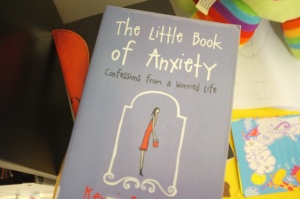Kerri Sackville is an Australian author whose first book, When My Husband Does the Dishes, was a light-hearted look at marriage after children. I read the book after going to a talk she gave as a guest author at my local library a few years ago. She seemed a charming and funny lady in person and her book was an entertaining read.
I recently read her second book, The Little Book of Anxiety, and am impressed again at her generosity. There’s some wisdom, and compassion, and desire to educate in this book.
She gives a lot of herself, explaining how it feels to suffer the intense anxiety and panic attacks that she has endured since childhood, and some observations of how her diagnosed anxiety disorder has impacted her family over the years.
She discusses dating her future husband (they’ve since separated), her pregnancies and miscarriages, the births and raising of her children, and forging her writing career. She also describes a traumatic birth experience and her grief over her sister’s death from an illness.
Still, Kerri is a comedic writer, and overall this is a funny book from the very beginning where she describes being too anxious to be able to think of ideas for her book about anxiety.
I can identify with her anxiety issues a lot, and I think a lot of women would to some degree. But what is most interesting to me in this book is her confession about faith – the fact that although she strongly identifies with her Jewish heritage, she does not believe that there is a God. This is a heavy topic and I admire that she broaches it, indeed devoting considerable space to her position.
I thought I’d share my reactions to her comments on why she can’t believe in God.
She begins by saying that she wishes she could believe in God because it would “solve all my worry problems…it would mean that everything was always going to God’s plan. If things went well for me, it was because it was God’s will. If things went badly for me, well, that was God’s will too.”
Speaking from a Christian perspective, it’s assuming too much that faith in God removes worry from a person’s life, since even Jesus was anxious on the eve of his impending Passion. But is true that the person of faith is called to see the hand of a loving God in everything that happens. The story of Jesus bears this out best, and the people that the Church recognises as saints have lived from this perspective.
But it hard for most of us ordinary mortals to remain serene regardless of the circumstances – and having faith in a loving God does not automatically provide immunity from worry. Ours is usually is a life-long process of growing in greater trust and confidence in God. In the meantime, we struggle with anxiety, with grief, with anger, and with doubt, and sometimes understand completely the cry of the stricken boy’s father to Jesus as told in Mark’s Gospel, “Yes I do believe. Help my unbelief!”
Kerri mentions the problem that God’s existence cannot be proved or disproved logically, but appreciates that the God-question is one which can’t addressed on that level. “Faith isn’t logical, which is why it’s called faith,” she writes. “You either have it or you don’t, and sadly, I don’t”.
It’s clear that what troubles her more than the lack of intellectual proof for God is the problem of the existence of suffering, particularly the suffering of innocent people, and she also questions the point of communicating with God.
“If there is a God, He seems to have His own agenda, which is pretty much unswayed by human requests,” she writes.
She doesn’t understand the prayer that “God’s will be done”.
“If it is God’s will, then he’ll do it right? God is…omnipotent; it’s not like anything is stopping him. And if it’s not God’s will, then presumably He won’t do it, and no amount of human begging will convince Him.”
Kerri is right. But the understanding in the Christian tradition is that our prayer doesn’t change God, rather it changes us. We pray that we will allow God’s will to be done in us, that we step out of our narrow view of the way we think things should be and allow for a much broader, larger, perspective to come in. It’s a brave and humble prayer.
This is something that believers have to remember – it’s easy to slip into the mode of trying to change God’s mind, to bargain, to request, to manipulate, rather than to sincerely ask (as Jesus did) that God’s will, not our own, be done.
Finally, she describes what it feels like to not have faith in a loving God, with a scene where she almost died after giving birth.
“I had looked death in the face and seen nothing but an abyss. Not believing in God, or a Secret, or the universe, is like walking a tightrope without a safety net. When you fall the whole impact is absorbed by you, and you alone.”
This is a very poignant image. Here she lays out her vulnerability, but also her pride in her self-sufficiency. Perhaps this is really the sticking point for her – that a belief in God involves a surrendering of oneself. She has suffered in life, and the suffering has made her stronger, more skilled at walking that tightrope. Perhaps with such hard-won resilience one might not be easily inclined to turn around and share the credit with God, especially when one doesn’t know him too well.
My reaction to the image of the lone tightrope walker is that one doesn’t have to walk it alone, that God is there as a guide and support, and also that authentic belief in and dependency on God does not take away anything from a person. It doesn’t infantilise a person, it only adds to their richness – immeasurably.
“I have come that they may have life, and have it to the full,” says Jesus. And, “The truth will set you free”.
But some people simply can’t or don’t or won’t believe, for whatever reason. I’m not judging Kerri in any way, just responding to her comments from a position of faith. She seems to be a good person.
I am much more sympathetic to her atheism than, say, Richard Dawkins’, who believes with the unreasonable faith of zealot that all religious faith is evil. Talk about illogical.
Also, I would add that while a life lived with faith in God can be very consoling it can also be just as scary as walking a tightrope without a safety net. Jesus said that of those whom have been given much, much more is expected.
We can forget the tightrope. I think he expects us to fly…..


I would suggest reading her Facebook page, some of her atheist views are extreme
LikeLike
So glad I found this post! I’m also glad that you countered the belief of atheists that those who believe in God have less worry with patience and gentleness. Nicely done.
For a very short time in my life, I was an atheist. (But never a militantly zealous, like Dawkins.) I wanted to know if I would be afraid of the abyss of no God, of no soul, of no eternal life, of nothingness. Turned out I wasn’t afraid to face this, even though I have a chronic illness that shortens my lifespan. And I did experience something of what you said – a certain pride in my self-sufficiency. Surrendering to God was the absolute hardest part of becoming a believer! But, I had a profound and wordless awareness of God’s presence one day. And my rational mind would no longer let me believe a lie and disbelief infinity and eternity. That image of a tightrope walker from the book that you shared reminds me of something that a priest told me when I was struggling with whether or not to become a believer:
He said that a trapeze artist can do beautiful and amazing things – but only if she lets go. She has to let go of the bar and fly through the air, trusting that she will be caught by the other. It’s a scary and daring thing to do, for there is no safety net. “Do something daring” he told me.
That daring thing was to take the leap of faith. I agree with you wholeheartedly… We are expected to fly…
LikeLike
Thanks for your comments Christina, and what a great priest!
LikeLiked by 1 person
Thank you for sharing this book! I also struggle with a pretty severe anxiety disorder. I am sad she feels she can’t believe in God because then all of her worry problems would go away. I’ve always found strength in this passage from 2 Corinthians 12: ” 8 Three times I pleaded with the Lord to take it away from me. 9 But he said to me, “My grace is sufficient for you, for my power is made perfect in weakness.” Therefore I will boast all the more gladly about my weaknesses, so that Christ’s power may rest on me. 10 That is why, for Christ’s sake, I delight in weaknesses, in insults, in hardships, in persecutions, in difficulties. For when I am weak, then I am strong.” Anxiety and worry are always a struggle, but that doesn’t mean God isn’t present. Having an anxiety disorder has taught me things about myself and others and allowed me to empathize with people I would never have understood before. It’s difficult to call anxiety a blessing, but I don’t consider it to be without value.
LikeLike
Thank you for your perspective, I admire anyone who lives with this.
LikeLike
It’s a beautiful prayer Pat.
LikeLike
My prayer in all that is to say 'Jesus I trust in You" It took me a long time to come to that. Actually many many years. …….Pat C…..
Sent: Saturday, August 09, 2014 at 7:15 PM From: "Marilyn Rodrigues" <comment-reply@wordpress.com> To: patdes@saintly.com Subject: [New post] The Little Book of Anxiety, and faith (or the absence of)
marilynrodrigues posted: "Kerri Sackville is an Australian author whose first book, When My Husband Does the Dishes, was a light-hearted look at marriage after children. I read the book after going to a talk she gave as a guest author at my local library a few years ago. She seeme"
LikeLike
This is simply my best read for this day. Thank you for sharing!
LikeLike
Thank you Michael!
LikeLike
Thanks Marilyn, I liked that, and a heartfelt thank you for your faith.
LikeLike
You’re welcome for the article Holly, and thank let’s God for the faith 🙂
LikeLike
Hahaha, you know what I mean!
LikeLike